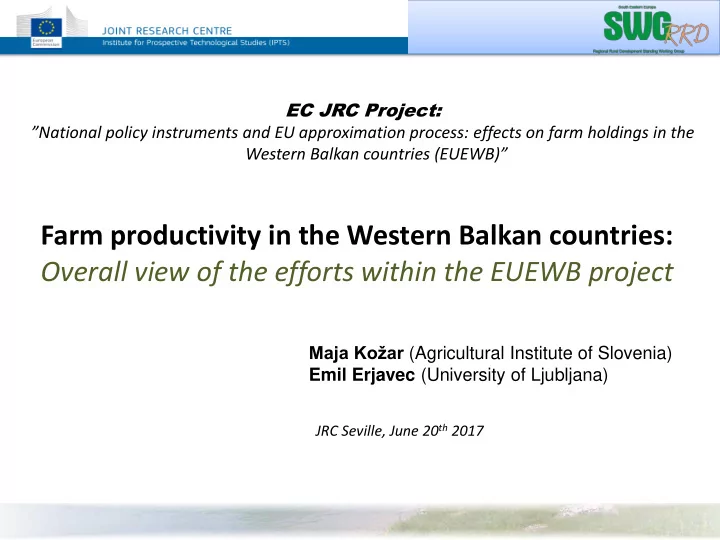

EC JRC Project: ”National policy instruments and EU approximation process: effects on farm holdings in the Western Balkan countries (EUEWB)” Farm productivity in the Western Balkan countries: Overall view of the efforts within the EUEWB project Maja Kožar (Agricultural Institute of Slovenia) Emil Erjavec (University of Ljubljana) JRC Seville, June 20 th 2017
Presentation outline • Introduction • Motivation for farm productivity analysis • Selected topics by countries ; MAC and SR more elaborate methodologies • Conclusions and ideas for future 2
Introduction Overall objective of the EUEWB project („ National policy instruments and EU approximation process: effects on farm holdings in the Western Balkan countries “) : • Strengthen cooperation among research community, administrations in WB to support to evidence-based policy decision-making Specific objectives of the project: • Monitor and collect information on agric. policy developments in WB (Task 1) • Evaluate availability and quality of farm level data in the WB, examine applicability for scientific analysis in supporting policy making (Task 2) • Explore possibility to extend IFM-CAP farm model to the WB (Task 3) • Conduct relevant quantitative policy impact analyses (Task 4) 3
Motivation for farm productivity analysis Early in the project, decision not to apply IFM CAP model: • Following Task 2 findings, 2 groups of WB countries in terms of availability and suitability of farm level data for quantitative policy analysis: - Macedonia and Serbia: farm level data available and fully suitable (with some adjustments); problems with availability (MAC), quality (SR)! - Other countries: farm level data potentially suitable for AL and KO* Main reasons: • Problems in accessing FADN data and progress made on IFM-CAP (SR: access to FADN data delayed, MAC: access to disaggregated data denied by the agric. ministry; privacy law) • Short project time (18M) • Missing important variables in FADN (e.g. farm weights for SR) • Lack of sufficient programming (GAMS) knowledge within the project team 4
Motivation for farm productivity analysis – cont. Alternative to IFM-CAP modeling exercise: • Data envelopment analysis (DEA) – MAC, SR • (Original) objective: calculate farm level productivity using DEA, analyze changes across different farm types, impact of subsidies • Data: different by countries (availability, quality …). Only SR to use FADN data • Countries: 5; only MN not participating 5
Selected topics by countries • Albania: Plot analysis of determinants of productivity of Albanian farms ( Zhllima E. et al.: The impact of crop rotation and land fragmentation on farm productivity in Albania) • Bosnia and Herzegovina, Republic of Srpska: Farm productivity based on available FADN type of data (Vaško Ž.: The farm productivity in Bosnia and Herzegovina – The overview of data availability and quality) • Kosovo*: Effects of irregular migration flow (2014-2015) on agricultural productivity in Kosovo* (Kerolli- Mustafa M. et al.: „Effect of irregular migration flow (2014 -2015) on agricultural productivity in Kosovo“) • Macedonia: Productivity of vegetables farms in Macedonia (Dimitrievski D. et al.: Technical efficiency analysis of Macedonian vegetable farms) • Serbia: Productivity of arable farms in Serbia (Todorović S. et al.: Importance and impact of agricultural policy measures on efficiency of pure arable farms in the Republic of Serbia; working title!) *This designation is without prejudice to positions on status, and is in line with UNSCR 1244 and the ICJ Opinion on the Kosovo declaration of independence. 6
Macedonia, Serbia • MAC, SR: more comprehensive research • Valuable analytical exercises: insights about (a part of) agriculture in the country and building potential for evidence-based decision-making Macedonia: • Topic: technical efficiency of vegetables farms in MAC • Method: DEA model (input oriented, BCC); scenario analysis • Data: FMS (Farm Monitoring System), 2011, 75 farms Serbia: • Topic: efficiency of pure arable farms in Serbia • Method: DEA (input oriented, BCC), two limit Tobit regression model • Data: FADN panel of farm type 151, 2014 (n=143) and 2015 (n=179) 7
Conclusions and ideas for future • Useful analytical exercise: - Farm-level data used (increase use & usability, feedback about data quality) - Insights into selected topics ; building potential for evidence-based policy - Strengthening analytical capacity in WB countries - Cooperation , regional and international (overall project objective) • Recommendations: - Further develop/upgrade regional agric. policy analytical work in WB - Use established infrastructure (WB agecon network and databases) - Unify methodology to enable (better) cross-country comparability (but problem of data availability and quality, capacity, financing, etc.) - Importance of stable funding • Proposed format for the future projects: - Topic, relevant for WB countries and EC (e.g., small farms, farms in ANC, strengthening competitiveness) - Cross-country survey, synthesis report, workshop - as in the EUEWB project 8
Thank you for attention! 9
Recommend
More recommend